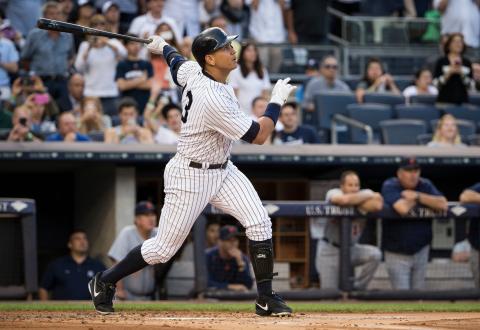The Upside to A-Rod
New York Times
August 12, 2016
by Doug Glanville
After an ignominious departure, a shot at redemption for Alex Rodriguez.
Alex Rodriguez has played his last game as a New York Yankee. Unceremoniously releasing him from his $275 million contract, which was supposed to run through the 2017 season, the Yankees have elected to speak now and not hold their peace: They will pay him the remaining $27 million of his contract and bring him on in an advisory capacity.
This brings to an ignominious close the Yankee chapter (and probably the playing chapter) in the career of one of the greatest players, statistically speaking, in the history of the game. Rodriguez has more than 3,000 hits, nearly 700 home runs and three Most Valuable Player Awards. But there will be no Mariano Rivera farewell tour for him, no Derek Jeter lovefest. He is being whisked off the diamond with a month and a half left in the season.
Debate will continue about his legacy, about how he will be remembered. This is understandable, given the constant attempts to determine the full extent of the relationship between his dominant performance on the field and performance-enhancing drugs. But his legacy is also a personal thing; each of us will remember him differently.
I was Rodriguez’s teammate during his 2003 M.V.P. season with the Texas Rangers, and again, briefly, during my spring training run with the Yankees in 2005. I had a good rapport with him, making it is easy to tell positive anecdotes about him.
Work ethic? I watched him get to spring training early and relentlessly hit balls from curveball machines to get his timing down. Teammate? He was not a motivator in a podium-style way, but he would whisper advice to you, as he has with his current teammate Didi Gregorius: “Control what you can control. It slows the game down.” Cliquish? No. He talked to journeymen, he talked to rookies, he talked to future Hall of Famers. He sent thank-you notes. He sent flowers to the team photographer on the birth of her child.
I have to concede that Rodriguez has also given me plenty of “teachable moments” in his 22-year career. I have four kids, and my eldest, my 8-year-old son, is already benefiting from the lessons of A-Rod 101 — a class about the march to greatness and the perils and pitfalls of trying to achieve it. I thank Rodriguez for unknowingly providing a wide range of themes for my parenting curriculum: greatness and sacrifice, risk and reward, being liked versus being respected, apologies and sincerity, right and wrong, practice and preach, clean and dirty.
In a recent news conference, Rodriguez said that he hoped to be remembered as “someone who tripped and fell a lot, but someone that kept getting up.” There is a lot of truth to this assessment, especially since baseball has historically been known for its forgiveness. Barry Bonds, Mark McGwire and Manny Ramirez — all tarnished by associations with performance-enhancing drugs — are coaches now. Jason Giambi said he was sorry so many times that we just acquiesced.
Yet there is a difference between forgiveness and redemption. Redemption involves taking an active role in changing the perception of you. Rodriguez, at 41, is still a young man. He has a real opportunity with the adviser role he has been granted with the Yankees. The team seems to respect his value to younger players, many of whom grew up unconditionally admiring him as a ballplayer.
Rodriguez could just tell war stories, talk about mechanics and pitcher patterns, reminisce about postseason glory. Or he could let the youth be beneficiaries of his honesty. They can take it. In fact, they already know. It’s better coming from him.
As a player who elected not to use performance-enhancing drugs, I used to think that only clean players could help make the game clean. But I have come to find that the candor of a player who used performance-enhancing drugs can have a lot of value, especially if he has reached a certain level of self-acceptance about his choices.
Rodriguez’s statistical legacy will always be in dispute because of those choices. But he still has control over some of the qualitative ways he will be remembered, and over his present-day impact. Time has run out on his playing days, and there is no longer a clear opponent to fight. The Red Sox will soon be just a memory, the booing of fans a faint echo. His self will remain, however, no matter his final home-run total.
I hope Rodriguez embraces this opportunity to shape young players. It is more than developing their talents; it is developing their hearts, minds, principles and souls. Rodriguez, like me, is a parent, and he knows that it is a powerful vote of confidence to place your future in someone’s hands. It also happens to be the greatest second chance anyone can receive.
After all, the games have all been played, the stats have all been counted.
Life is what counts now.
Republished from The New York Times
Photo: Alex Rodriguez watches his 3000th hit on a home run in June 2015.
Photo Credit: Mark Kauzlarich/The New York Times






